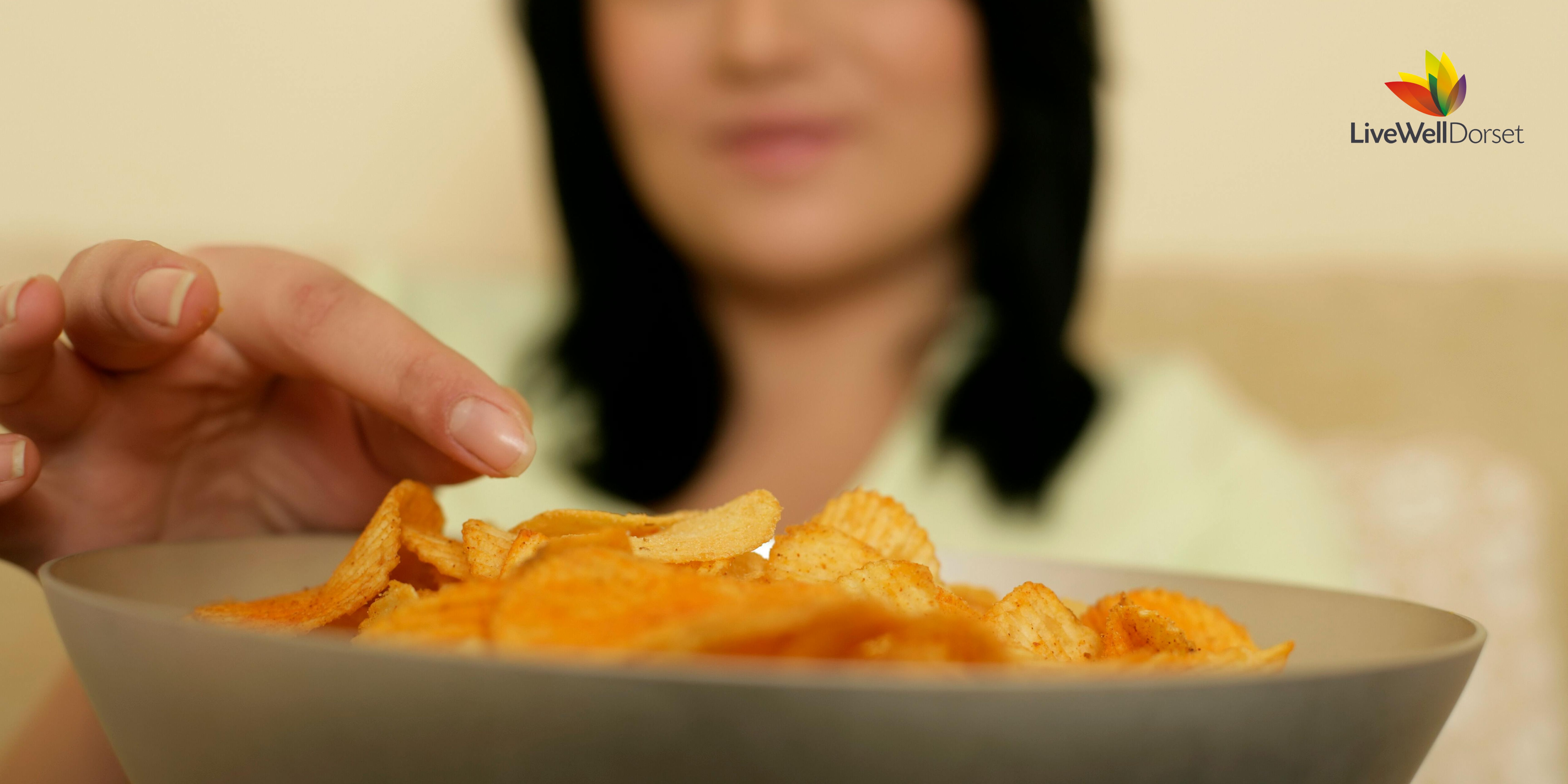
 Livewell Dorset Home page link
Livewell Dorset Home page link
0800 840 1628 • Monday - Friday 9am - 6:30pm Contact Us

Crisps, biscuits...it’s hard not to dip in – or to know when to stop. How can you manage snacking in a healthy way? LiveWell Behaviour Change Coach Dan has some great solutions.
Boredom, stress, anxiety, low mood, tiredness, and loneliness can all play a role in why we snack. But how do we break these habits?
If snacking is your go-to when you’re feeling bored, you might benefit from a change of scenery – go out for a walk, or even just go to a different room. We can trigger cravings for snacks by following the same old routine like sitting in the same place every day but you can swap that out with new habits like getting a glass of water or a hot drink instead.
Distractions are important when you’re trying to break a habit, so read a book, clean/tidy, watch a film or show, play a video game, listen to a podcast, call someone, and ask how their day has been. Consider trying something new, such as joining a support group or volunteering and find what works best for you.
If you eat when you’re feeling stressed, anxious or low you could try to distract yourself by getting into the habit of doing something absorbing and repetitive like knitting, something where you can let your feelings out, like journaling or something transporting, like a good book. You could also try mindfulness techniques such as meditation, affirmations, breathing exercises or colouring. You could also try removing yourself from a situation by going for a short walk of if you're feeling overwhelmed, try breaking things down into smaller, more manageable steps.
Try taking in dedicated healthier options and ask other people not to offer you other foods. Try keeping snacks out of sight and out of mind. Be honest with people around you about what you’re trying to achieve, so that they can support you inside and outside of work. If you work from home, you can still apply many of the same techniques, try planning out what you’re going to eat, plan for healthier snacking and try keeping less healthy options out of sight.
Do you snack at parties? When possible, take your own food with you; however, this is not always possible! Try going in with a plan, be that to have just one plate full or to only eat certain foods. If you tend to graze throughout an event, try to space out your eating habits, push back the temptation and socialise, distract yourself before returning for more food, you could even set a timer.
It goes without saying that you can’t snack on things if you don’t buy them in the first place, but that can be difficult if you live with other people! Try keeping to a strict shopping list, ask others to come shopping with you to keep you on track and ask them to keep trigger foods out of sight.
If you’re trying to cut down on snacking to achieve a specific goal like weight loss, keep that goal in mind and celebrate your achievements along the way. If someone else in your life is trying to achieve a similar goal, you may be able to work together and support each other.
Adding structure to your diet can also help with reducing snacking, try writing out what you’re going to eat each and try sticking to that.
If you’re also struggling with big portion sizes, try using smaller plates/bowls or try sticking to recipes that have specific quantities of ingredients.
It can sometimes be difficult to tell if you are actually hungry or if you’re just craving a specific food. Try drinking a glass of water and distracting yourself. If you are keeping yourself busy but still find yourself craving snacks, then it’s good to have some healthier options at the ready:
Instead of cakes: Scotch pancakes, crumpets, a slice of malt loaf or fruited teacake
Instead of crisps: crackers topped with lower-fat cheese, plain popcorn or rice cakes, unsalted mixed nuts
Instead of sweet treats: sugar-free jelly, lower-sugar yoghurts, or lower-sugar rice pudding, fresh or tinned fruit or fruit salad
Talk to us about coaching and resources to help maintain a healthy weight with good eating habits. You can call free on 0800 840 1628 or register here
Your search has returned 105 more results
View all results